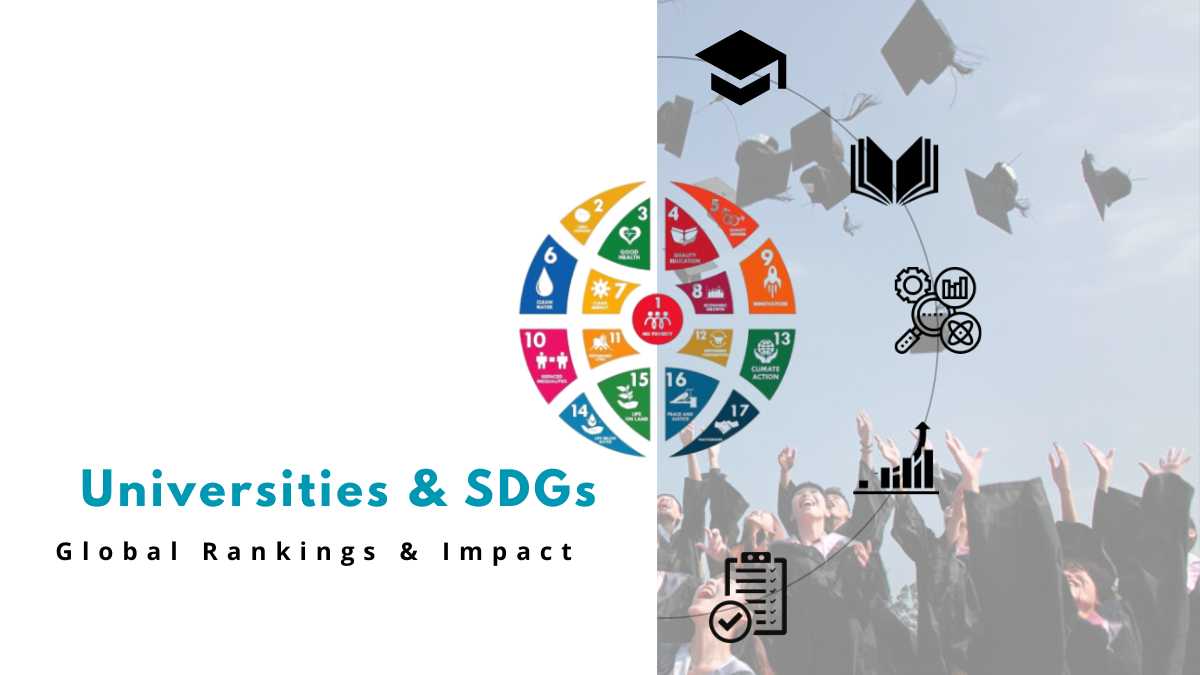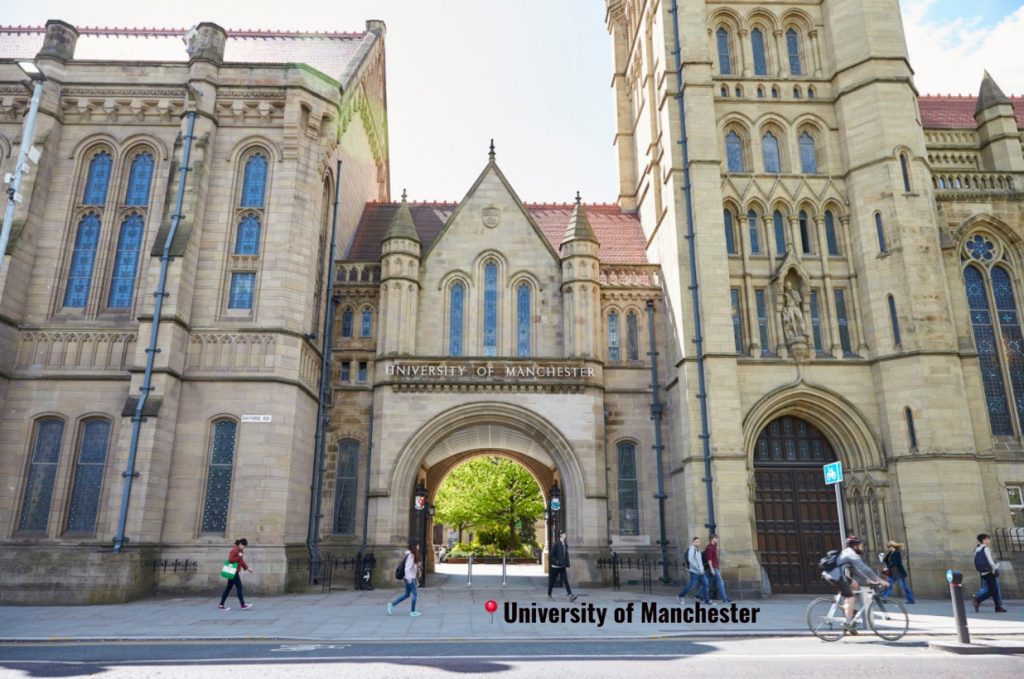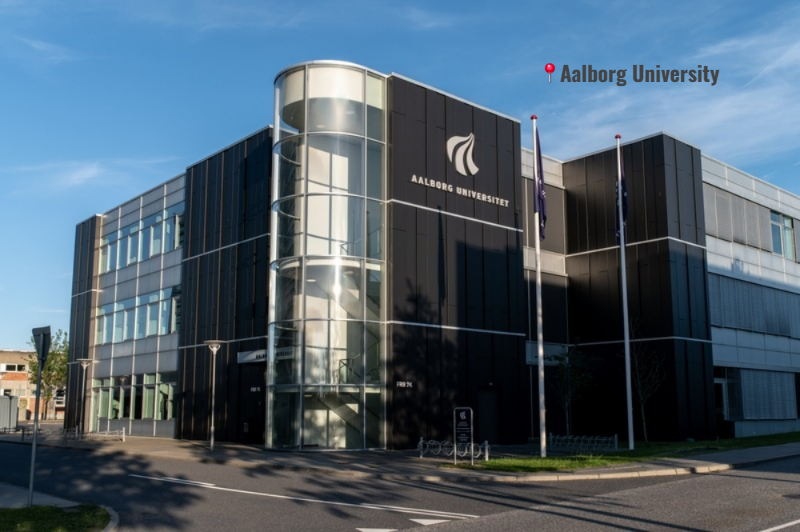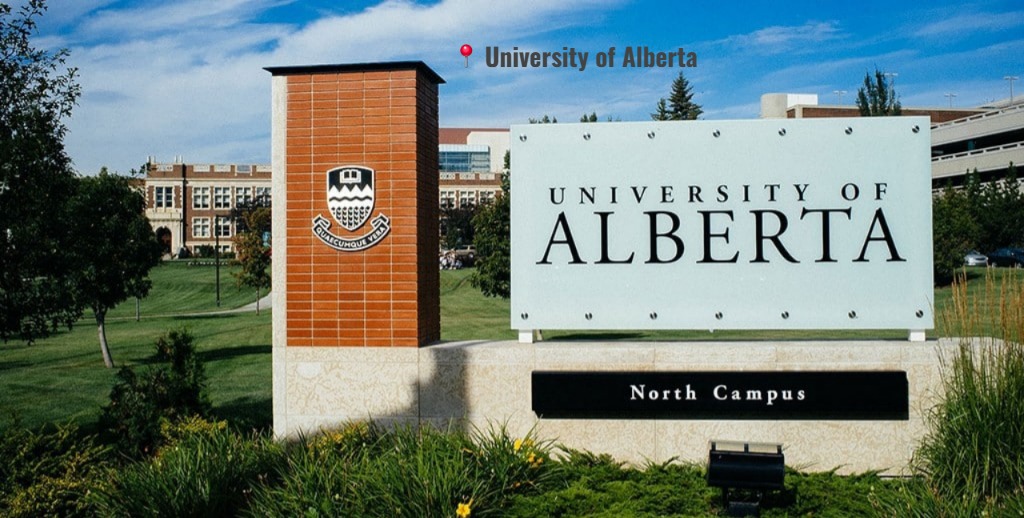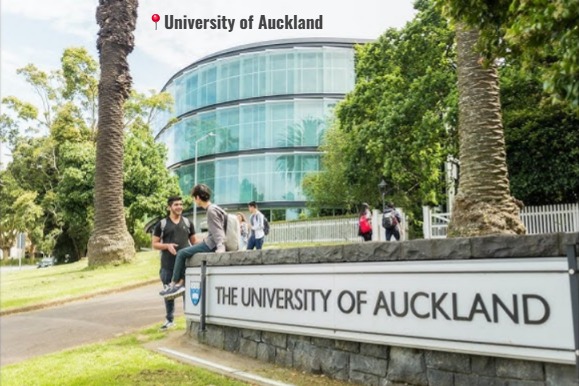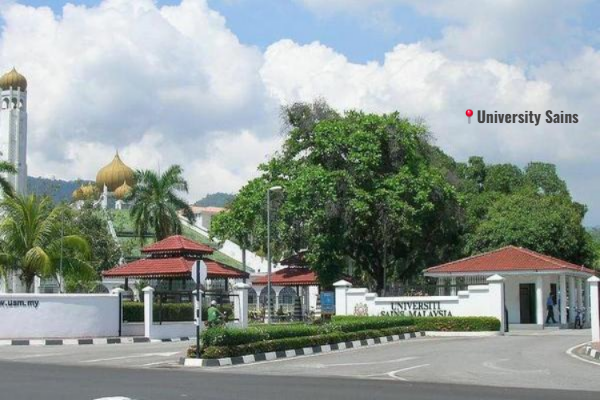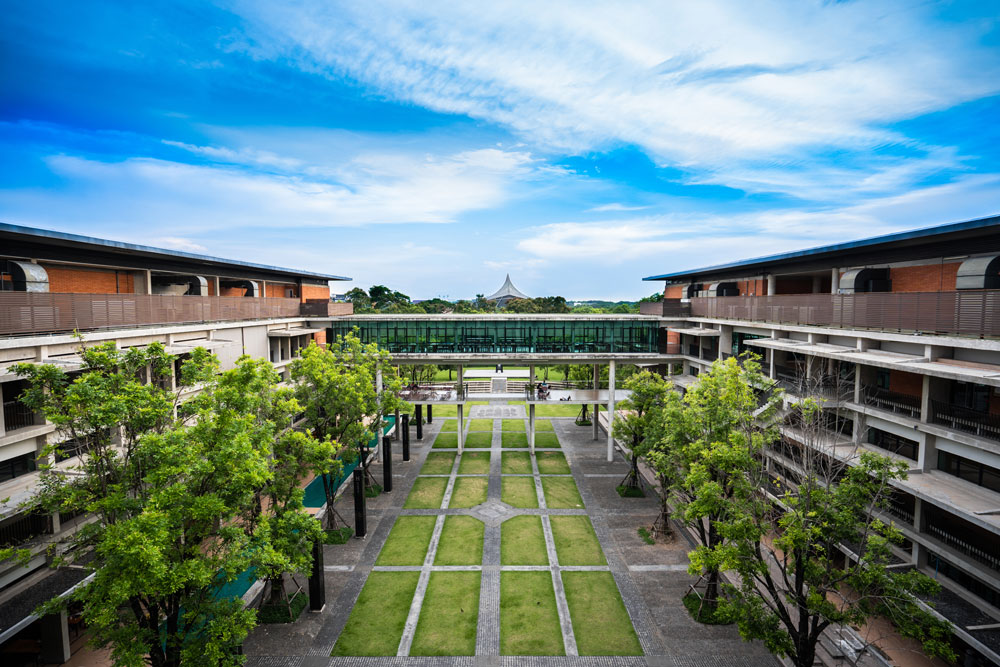As challenges arise across the globe in all sectors of being, like climate change, inequality, and access to education, universities are stepping up to take an active role in shaping a sustainable future.
Higher Education Institutions or HEI’s are making a significant contribution to the Diplomacy for a Better World: Linking International Relations with Sustainable Development through their research, operations and outreach. The Times Higher Education Impact Rankings offer a glimpse into how well universities across the globe are doing in implementing these goals.
For students and young professionals in International Relations, understanding how universities contribute to sustainable development goals is crucial for making informed decisions towards shaping your academic lives and career.
Universities Leading the Way in SDG Implementation
Over the years, an increasing number of universities have established themselves as global leaders in sustainability and social impact. These institutions are not just preaching change but actively engaging in activities that address some of the world’s most important issues.
Here are 10 universities that stand out for their impactful work on the SDGs:
1. Western Sydney University (Australia)
Western Sydney University is known for its progressive stand-point on sustainability, and is recognised for its work towards SDG 10 (Reduced Inequality), SDG 12 (Responsible Consumption and Production), and SDG 13 (Climate Action). The university promotes inclusive education and environmental management across all its campuses.
2. University of Manchester (United Kingdom)
The University of Manchester is known for its work on SDG 1 (No Poverty), SDG 4 (Quality Education), and SDG 10 (Reduced Inequality). The university emphasises community engagement, social responsibility, and international collaboration to drive positive change.
3. Aalborg University (Denmark)
Aalborg University is known for its remarkable work in SDG 4, SDG 9, and SDG 13. Its problem-based learning model and commitment to practical research make it a strong contender in higher education in sustainability.
4. University of Alberta (Canada)
The University of Alberta has worked towards SDG 7 (Affordable and Clean Energy), SDG 9 (Industry, Innovation, and Infrastructure), and SDG 13. Its research centers focus on clean energy and sustainable development, helping to offer practical solutions for global problems.
5. Arizona State University (Tempe, United States)
A leader in sustainability-focused research, Arizona State University (ASU) has been applauded for its initiatives supporting SDG 7 (Affordable and Clean Energy), SDG 12, and SDG 13. ASU incorporates sustainable practices into all aspects of university life and encourages students to get involved in environmental innovation.
6. Yonsei University (Seoul Campus, South Korea)
Yonsei University contributes significantly to SDG 4 (Quality Education), SDG 9 (Industry, Innovation, and Infrastructure), and SDG 13. Focusing strongly on research, innovation, and policy guidance, Yonsei plays a crucial role in sustainable development in East Asia.
7. University of Auckland (New Zealand)
The University of Auckland is frequently ranked highly in the Times Higher Education Impact Rankings. It performs particularly well in SDG 3 (Good Health and Well-being), SDG 4 (Quality Education), and SDG 13 (Climate Action). The university integrates cultural knowledge into its curriculum and has numerous sustainability initiatives on campus.
8. Universiti Sains Malaysia (Malaysia)
Universiti Sains Malaysia has shown progress in SDG 6 (Clean Water and Sanitation), SDG 7 (Affordable and Clean Energy), and SDG 13. The university’s research initiatives emphasise on solving local and regional problems, especially in environmental conservation, which is a very important part of sustainable development.
9. Mahidol University (Thailand)
Known for its work in SDG 3 (Good Health and Well-being), SDG 6 (Clean Water and Sanitation), and SDG 13 (Climate Action), Mahidol University is deeply involved in public health and environmental sustainability, addressing critical issues facing Thailand and Southeast Asia.
10. University of Bologna (Italy)
As one of the oldest universities in the world, the University of Bologna plays a leading role in research towards to SDG 2 (Zero hunger), SDG 12, and SDG 13 . The university is known particularly for its work in food sustainability and responsible consumption.
Understanding QS and THE University Rankings
Global university rankings, first and foremost, are tools that evaluate and compare the performance of HEIs worldwide. As a result, they provide insights into a university’s academic reputation, research output, international outlook and overall quality of education. The QS World University Rankings and the Times Higher Education (THE) World Rankings are considered the most accurate.
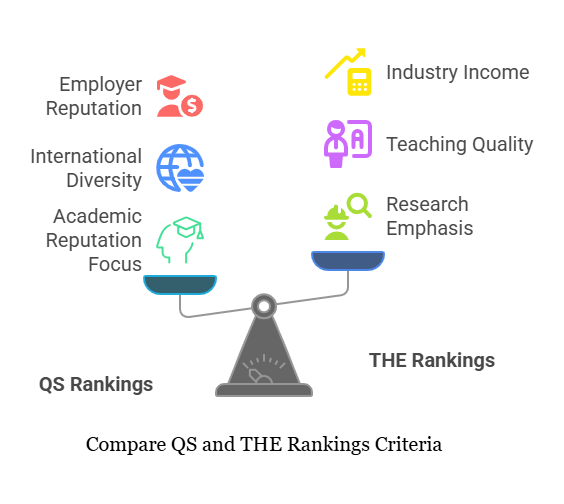
QS on one hand, emphasizes indicators like:
- Academic reputation
- Employer reputation
- Faculty/student ratio
- International diversity
THE, on the other hand, emphasises more on:
- Research
- Teaching
- Citations
- International engagement
- Industry income
These rankings play a critical role in shaping higher education decisions globally. For instance, a high ranking can enhance a university’s prestige by attracting top-tier faculty, as a result of which, the number of student applications increase. In the same way, students and young professionals rely on these rankings to identify institutions that align with their academic and career goals.
Below is an Overview of the said Universities Global Rankings:
| University Name | Country | QS Ranking 2025 | THE World University Rankings 2025 |
|---|---|---|---|
| Western Sydney University | Australia | 384 | 301-350 |
| University of Manchester | United Kingdom | 34 | 53 |
| Aalborg University | Denmark | 306 | 251-300 |
| University of Alberta | Canada | 96 | 116 |
| Arizona State University (Tempe) | United States | 200 | 201-250 |
| Yonsei University (Seoul Campus) | South Korea | 56 | 102 |
| University of Auckland | New Zealand | 65 | 152 |
| Universiti Sains Malaysia | Malaysia | 146 | 401-500 |
| Mahidol University | Thailand | 368 | 601-800 |
| University of Bologna | Italy | 133 | 146 |
How HEIs Are Measured for Their SDG Impact: THE Impact Rankings Explained
The Times Higher Education Impact (THE) Rankings are the only global performance tables that assess universities against the SDGs. Unlike traditional rankings that focus on academic output alone, THE Impact Rankings evaluate universities based on 3 key indicators:
- Research: Quantity and quality of research related to the SDGs.
- Outreach: Community engagement and policy influence.
- Stewardship: Sustainable practices within university operations.
This method allows for a holistic understanding of how universities contribute towards making a positive change globally.
How Universities Contribute to Sustainable Development Goals
Universities contribute to SDGs in the following ways:
- Curriculum Integration: Incorporating sustainability in all courses
- Community Engagement: Working with local and international commutes on projects supporting SDGs
- Policy Research: Producing data and insights that influence public policy
- Green Campuses: Enforcing sustainable practices in waste management, energy use, and infrastructure.
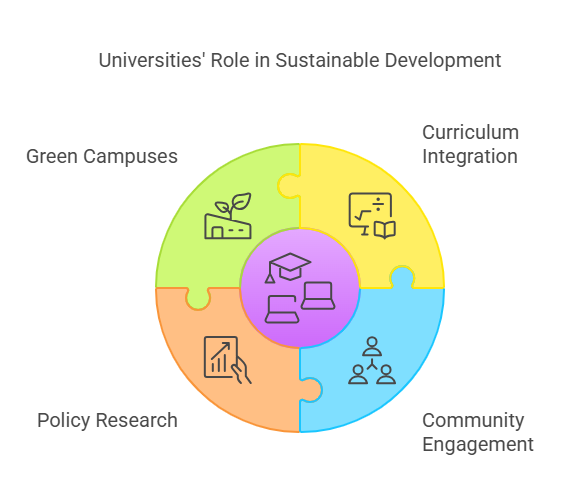
These contributions make the universities ideal places to shape the minds of individuals into becoming future leaders in sustainable development
| University Name | Country | THE Impact Rankings (2024) |
| Western Sydney University | Australia | 1 |
| University of Manchester | United Kingdom | 2 |
| Aalborg University | Denmark | 4 |
| University of Alberta | Canada | 6 |
| Arizona State University (Tempe) | United States | 9 |
| Yonsei University (Seoul Campus) | South Korea | 11 |
| University of Auckland | New Zealand | 13 |
| Universiti Sains Malaysia | Malaysia | 18 |
| Mahidol University | Thailand | 19 |
| University of Bologna | Italy | 67 |
The Role of International Collaboration in Advancing SDG Education
Collaborations with international universities is an essential part of sustainable development, as it addresses global challenges. Partnerships between institutions fosters knowledge sharing, an increased range of resources, and the best practices required to achieve their goal.
These collaborations are:
- Joint Research Projects on topics of renewable energy, public health, and sustainable agriculture among others.
- Exchange Programs that provide students with cross-cultural experiences on sustainability.
- Global Networking in international initiatives and partnerships aimed at promoting SDG goals.
These initiatives taken by the universities not only improve the quality of education, they also increase the real-world impact of academic research.
How Students Benefit from Studying at SDG-Focused Universities
Studying at a university that prioritises SDGs has multiple advantages for students and professionals pursuing International Relations as their field of interest.
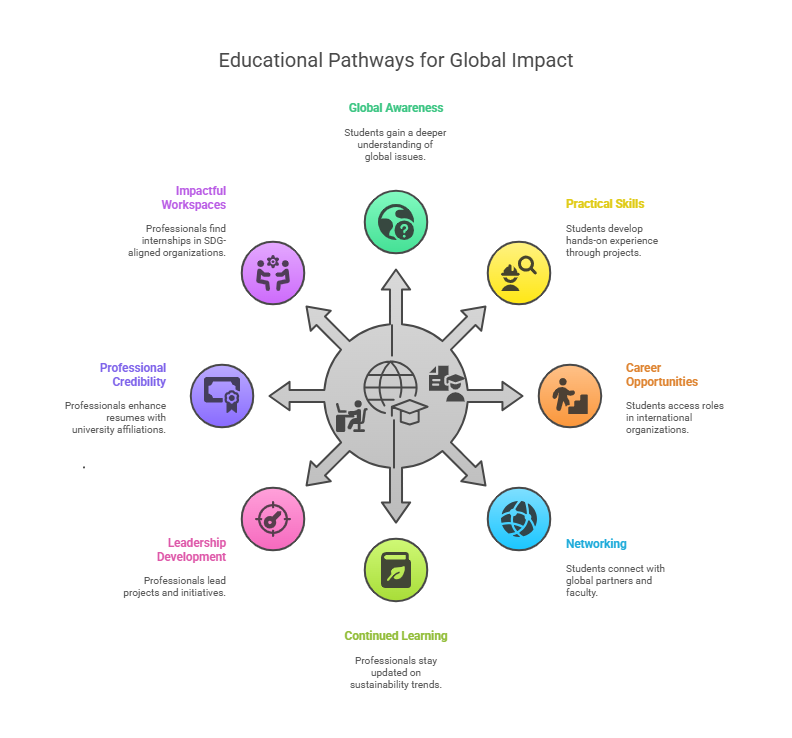
For Students:
- Global Awareness: A deeper understanding of global issues like poverty, climate change, and human rights
- Practical Skills: Hands-on experience through fieldwork, research, and sustainability projects that prepare students for real-world challenges
- Career Opportunities: Access to roles in international organisations, NGOs, and industries that focus on sustainability, and policy making bodies
- Networking: Connecting students, faculty, and partners around the world through academic programs and international summits
For Young Professionals:
- Continued Learning: Professionals can stay updated on global sustainability trends through alumni programs, short courses and certifications
- Developing Leadership Qualities: Opportunities to lead projects and initiatives through programs led by universities
- Professional Credibility: Associations with universities recognised for their SDG efforts add value to resumes, in fields like diplomacy, environmental consultancy, and global governance
- Impactful Workspaces: Partnerships between universities and companies often lead to internships and job placements with organisations whose goals align with that of the SDGs
Choosing a university that prioritises sustainability isn’t merely a decision for academic excellence, it’s a commitment to being part of the solution and enhancing career impact in the long run.
The importance for education in sustainability is increasing day by day. As a result, university rankings are becoming a crucial tool for students who are looking to pursue a career in International Relations. They show institutions that not only focus on academics, but also work towards their social responsibilities. Whether you’re a student or a professional who is just starting out, choosing a university that aligns their goals with the SDGs will lead to a career with a stronger impact towards a better tomorrow.
Written by Manjul Kathotia.
